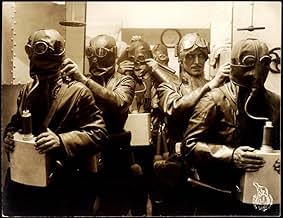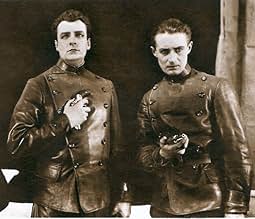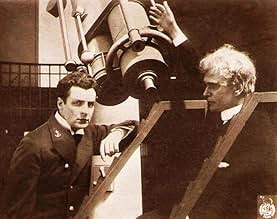Aggiungi una trama nella tua linguaA group of researchers from Earth travel in a spaceship to Mars, where, to big surprise, they find a peaceful vegetarian and pacifist civilization.A group of researchers from Earth travel in a spaceship to Mars, where, to big surprise, they find a peaceful vegetarian and pacifist civilization.A group of researchers from Earth travel in a spaceship to Mars, where, to big surprise, they find a peaceful vegetarian and pacifist civilization.
- Regia
- Sceneggiatura
- Star
Nils Asther
- Wounded Martian Citizen
- (non citato nei titoli originali)
Alfred Osmund
- Martian Priest
- (non citato nei titoli originali)
Recensioni in evidenza
Avanti Planeteros (Gunnar Tolnaes) is a soldier returned home after the war. His astronomer father (Nicolai Neiiendam) convinces him that the future is in the stars, so Avanti teams with Dr. Krafft (Alf Blutecher), who is betrothed to Avanti's sister Corona (Zanny Petersen), to build a spaceship capable of reaching Mars. They construct something that looks like a small, metal blimp with bi-plane wings, and along with a crew of about 8 other guys, they set off for Mars. Once there, they discover an idyllic paradise of robe-wearing, God-loving vegetarians. And of course a Martian woman (Lilly Jacobson) who immediately falls in love with Avanti. Also featuring Frederik Jacobsen as Professor Dubius.
This had to have been silly stuff even in 1918. After the end of WWI I'm sure that most Europeans were looking for a peaceful new way of life as far from war and misery as possible. The Martians aren't aliens as much as idealized humans, looking a bit like Ancient Greeks but with Egyptian ankhs on all of their clothing (Ancient Aliens?!?). The acting is hammy, the effects as primitive as one would imagine, and the story both juvenile and overlong. However, this is an important foundational step in the genre, which is why it's one of the 101 Sci-Fi Movies to See Before You Die.
This had to have been silly stuff even in 1918. After the end of WWI I'm sure that most Europeans were looking for a peaceful new way of life as far from war and misery as possible. The Martians aren't aliens as much as idealized humans, looking a bit like Ancient Greeks but with Egyptian ankhs on all of their clothing (Ancient Aliens?!?). The acting is hammy, the effects as primitive as one would imagine, and the story both juvenile and overlong. However, this is an important foundational step in the genre, which is why it's one of the 101 Sci-Fi Movies to See Before You Die.
I know I've seen a fair portion of this film as part of a series on rare silent movies, which was shown on TV around 25 years ago. It was beautiful and fascinating, and I yearned to see more of it, although most published literature states that it is 'lost'.
As it is extremely unlikely that the film will ever see the light of day in its complete form, a spoiler warning is irrelevant, and the following is gleaned from published synopses more than from my personal recollection.
It is an early space opera, concerning a team of explorers who visit the planet Mars, and encounter a race of peace-loving vegetarians (is there any other kind? Oh, sit down, Adolph!). They return to Earth with the high priest's lovely daughter, and the plea for peace is threatened only by one villain who is dealt with by what can only be described as an Act of God.
Apart from George Melies' crazy moon explorer fantasies, this seems to be the first interplanetary adventure film in history, and from a country (Denmark) not noted for science-fiction films of any kind. Maybe they thought that they'd never do one better than this.
We might giggle at the idea that the spaceship had propellers on its wings, but come on...we are still accepting lots of logistically improbable and impossible concepts in films of today. I hope this film does still exist somewhere. The fragments I've seen, and the material I've read, makes me yearn to experience the whole of this 90-year-old space opera.
As it is extremely unlikely that the film will ever see the light of day in its complete form, a spoiler warning is irrelevant, and the following is gleaned from published synopses more than from my personal recollection.
It is an early space opera, concerning a team of explorers who visit the planet Mars, and encounter a race of peace-loving vegetarians (is there any other kind? Oh, sit down, Adolph!). They return to Earth with the high priest's lovely daughter, and the plea for peace is threatened only by one villain who is dealt with by what can only be described as an Act of God.
Apart from George Melies' crazy moon explorer fantasies, this seems to be the first interplanetary adventure film in history, and from a country (Denmark) not noted for science-fiction films of any kind. Maybe they thought that they'd never do one better than this.
We might giggle at the idea that the spaceship had propellers on its wings, but come on...we are still accepting lots of logistically improbable and impossible concepts in films of today. I hope this film does still exist somewhere. The fragments I've seen, and the material I've read, makes me yearn to experience the whole of this 90-year-old space opera.
I don't know of any other full length science fiction film that was made before The Trip to Mars. So in that sense it's the first. I watched other silent sci-fi films from the beginning of the 20th century but all of them were no longer than 15 minutes, and this one was the first of that era that I took seriously.
It held my attention through the movie and it has some very nice and moving scenes. Despite being silent the makers managed to pack it with an interesting and engaging plot, good actors play, science fiction, drama, adventure and a love story. It has an amazing well-built spaceship and special effects are fairly good for the time. The film has very strong religious and Christianity-rooted undertones with a message of hope for humanity plagued with murder, hatred and deceit. Another surprise was that the film was nothing like many other sci-fi movies, most of which came out of Hollywood - just clichés that were about either aliens being vicious monsters, or some oversexed alien women, or an imbecile earth superhero. This one does offer the viewer a chance to engage his brain and heart which is probably more important that the above mentioned infantile and unintelligent consumer rubbish.
So it was quite an unexpected surprise to see such an old and yet very good film and I very much recommend it to any lover of science fiction who can be interested in the oldies just as much as the modern cinema and likes to get something out of film.
It held my attention through the movie and it has some very nice and moving scenes. Despite being silent the makers managed to pack it with an interesting and engaging plot, good actors play, science fiction, drama, adventure and a love story. It has an amazing well-built spaceship and special effects are fairly good for the time. The film has very strong religious and Christianity-rooted undertones with a message of hope for humanity plagued with murder, hatred and deceit. Another surprise was that the film was nothing like many other sci-fi movies, most of which came out of Hollywood - just clichés that were about either aliens being vicious monsters, or some oversexed alien women, or an imbecile earth superhero. This one does offer the viewer a chance to engage his brain and heart which is probably more important that the above mentioned infantile and unintelligent consumer rubbish.
So it was quite an unexpected surprise to see such an old and yet very good film and I very much recommend it to any lover of science fiction who can be interested in the oldies just as much as the modern cinema and likes to get something out of film.
Years before the movie serial Flash Gordon came upon the scene, the first science-fiction space opera was Denmark's February 1918 "A Trip To Mars." Produced during the middle of World War One, the movie paints a utopian vision of peace & love on the planet Mars from its inhabitants. The line "Love is the Force you call God" is repeated several times, illustrating how screenwriter Ole Olsen felt Earthlings needed to be reminded of that lesson while the European carnage was happening next door to Denmark.
It has been noted "A Trip To Mars" is the first science fiction feature-length movie ever produced. There have been earlier alien-encounter films on Mars and the Moon released, but they were "shorts." The Mars journey the Danes created here was made at a time when lines thought to be canals existing on the planet could be seen from our best telescopes, hinting there was a sophisticated alien life there. When the movie's Earthlings land on the very hospitable planet, its residents welcome their visitors with open arms--that is until a gun is produce by one of the "barbaric" guests to shoot down a bird, setting off a contrast between the two civilizations.
Once things are set right, the viewer appreciates the love and kindness of the Martians, one of the very few times the Red Planet is shown to have benevolent aliens (See list of top Mars movies ranked in below links). Just as the real life Pocahontas was brought to England to showcase the Native Americans, Mars' knockout female Corona was transported to Earth to convey a heavenly message of peace, love and understanding.
A portion of "A Trip To Mars" is devoted to the technology of transporting men to another planet. Many inventions and scientific research have gone towards present-day's outer space achievements, but the fact the film devotes its time towards space travel qualifies it as a "space opera," a phrase coined in 1941. Like soap operas, space operas have dramatic impact on not only the method of travel, but the dramatics of human encounters with alien life. In "A Trip To Mars," the movie's aim is to impact its audience with a message that was hoped to change the direction of Western civilization, just as Thomas More had intended in his book "Utopia" and James Hilton in his "Shangri-La." With "The War To End All Wars" becoming just one in a string of long bloody conflicts following it, the Martian example hasn't quite sunk in yet.
It has been noted "A Trip To Mars" is the first science fiction feature-length movie ever produced. There have been earlier alien-encounter films on Mars and the Moon released, but they were "shorts." The Mars journey the Danes created here was made at a time when lines thought to be canals existing on the planet could be seen from our best telescopes, hinting there was a sophisticated alien life there. When the movie's Earthlings land on the very hospitable planet, its residents welcome their visitors with open arms--that is until a gun is produce by one of the "barbaric" guests to shoot down a bird, setting off a contrast between the two civilizations.
Once things are set right, the viewer appreciates the love and kindness of the Martians, one of the very few times the Red Planet is shown to have benevolent aliens (See list of top Mars movies ranked in below links). Just as the real life Pocahontas was brought to England to showcase the Native Americans, Mars' knockout female Corona was transported to Earth to convey a heavenly message of peace, love and understanding.
A portion of "A Trip To Mars" is devoted to the technology of transporting men to another planet. Many inventions and scientific research have gone towards present-day's outer space achievements, but the fact the film devotes its time towards space travel qualifies it as a "space opera," a phrase coined in 1941. Like soap operas, space operas have dramatic impact on not only the method of travel, but the dramatics of human encounters with alien life. In "A Trip To Mars," the movie's aim is to impact its audience with a message that was hoped to change the direction of Western civilization, just as Thomas More had intended in his book "Utopia" and James Hilton in his "Shangri-La." With "The War To End All Wars" becoming just one in a string of long bloody conflicts following it, the Martian example hasn't quite sunk in yet.
The view of the world in this movie is clearly dated, but as the movie is from 1918, it's hard to put it against it. What is more impressive is everything it does right. This is not a movie using science fiction as a gimmick - it uses the genre to explore ideas about the time it was made. In the end of the first world war, here's a movie exploring if mankind can live in peace, how we treat our prisoners, how life in a submarine (here: spacecraft) can affect ones mental health, how pushing science forward is a global affair, and can unite different parts of the world, and so on.
While I am not sure just how much the general public knew about astronomy - this movie presents the mission to mars in a way that seems realistic. It takes time, people doubt it, and it takes a toll on the members. They point out where mars will be as they leave Earth, and where it will be when they arrive. The spacecraft itself is like a submarine with a propeller and wings. Mars itself I am sure was quite a mystery back then, so the fact that they made it Earth-like is very understandable. It also opened up for them using Mars and Martians in a way that let the film makers comment on the people of Earth.
The movie is not subtle in the message it is conveying: people on earth should stop with wars and violence and rather go with love. In the end of the most gruesome war in world history up till that point - that sounds like a good message.
The worst part about this movie is the one evil character in it. He serves little purpose, and undermines the underlying message of the film that humans are capable of being good.
While I am not sure just how much the general public knew about astronomy - this movie presents the mission to mars in a way that seems realistic. It takes time, people doubt it, and it takes a toll on the members. They point out where mars will be as they leave Earth, and where it will be when they arrive. The spacecraft itself is like a submarine with a propeller and wings. Mars itself I am sure was quite a mystery back then, so the fact that they made it Earth-like is very understandable. It also opened up for them using Mars and Martians in a way that let the film makers comment on the people of Earth.
The movie is not subtle in the message it is conveying: people on earth should stop with wars and violence and rather go with love. In the end of the most gruesome war in world history up till that point - that sounds like a good message.
The worst part about this movie is the one evil character in it. He serves little purpose, and undermines the underlying message of the film that humans are capable of being good.
Lo sapevi?
- QuizReported by the British press in 1919 to have cost £20,000. After inflation this would be approaching £1.5 million in 2024.
- Citazioni
Avanti Planetaros - Captain of the Space Ship: Glowing and calling planets... I am coming!
I più visti
Accedi per valutare e creare un elenco di titoli salvati per ottenere consigli personalizzati
Dettagli
- Data di uscita
- Paese di origine
- Sito ufficiale
- Lingua
- Celebre anche come
- A Trip to Mars
- Azienda produttrice
- Vedi altri crediti dell’azienda su IMDbPro
- Tempo di esecuzione1 ora 37 minuti
- Colore
- Mix di suoni
- Proporzioni
- 1.33 : 1
Contribuisci a questa pagina
Suggerisci una modifica o aggiungi i contenuti mancanti

Divario superiore
By what name was L'astronave (1918) officially released in Canada in English?
Rispondi

























